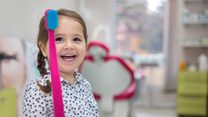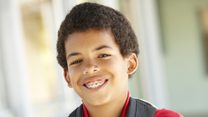Developing proper oral hygiene habits early in childhood is crucial in ensuring continued practise into adulthood. This means starting very early, even before your baby’s teeth have emerged.
On This Page
Instilling your young children with sound dental practices not only prevents expensive dentist bills later on, but sets the foundation for a confident and radiant smile as they grow.
As babies, this simply involves ensuring they are used to having their gums and then teeth touched when they first appear. As they develop, successful teeth brushing techniques, maintaining good oral hygiene in general, regular dental visits, and a well-rounded diet are all important.
At birth, start by cleaning your child’s gums with a soft cloth and water. This oral stimulation may help prevent fungal infections, such as oral thrush, and also makes acceptance of the toothbrush less of a challenge once the teeth start to erupt.
Primary tooth enamel is much thinner and less resistant to decay than adult teeth, so following these essential guidelines will likely set your child up for a lifetime of good dental health.
First Visit to the Dentist

The American Academy of Paediatrics (AAP), the American Dental Association (ADA) and the American Academy of Paediatric Dentistry (AAPD) recommend establishing a 'Dental Home' for your child by one year of age, with follow-up visits every six months. Your child’s first visit will likely include a quick check-up to help them become familiar with the sights and sounds of a dental clinic. Turning this appointment into a fun and warm experience ensures your child will feel excited and motivated to return.
“Consistency is everything. The earlier these good habits are established, the more easily children will accept and tolerate both home care and the vital, routine dental visits," recommends Dr Jemma Facenfield, dentist at 7Dental Kids. “During the first visit, a dentist will also discuss teeth-friendly diet recommendations, tips and tricks, measures on preventing the onset of tooth decay, and how to encourage your child to brush and maintain healthy teeth and gums for life."
Should My Child Brush His/Her Own Teeth?
Dr Facenfield believes that fostering early independence in maintaining oral hygiene is important for your child’s development, and will have a significant impact on their future health routines. However, until around eight years of age, toothbrushing should be both supported and monitored by a parent, to ensure that all surfaces have been adequately cleaned. At the same time, allowing your child to assist in the process will help to build their confidence and dexterity.
Related Articles
Proper Tooth Brushing, Frequency & Technique
Prevention is key; the AAPD recommends using fluoridated toothpaste once the teeth begin erupting. Fluoride aids in remineralisation of enamel and helps to prevent childhood tooth decay which can spread quickly. Start with a small smear of toothpaste, gradually increasing to a pea-sized amount, once all 20 primary teeth have erupted. A soft age-appropriate toothbrush is recommended.
Helpful Tip
Have a positive dental attitude! In between meals, always opt for savoury snacks and limit sweets or candies. Instead of sugary sports drinks and sodas, choose water. It's the best option to promote healthy teeth and proper hydration.
Brush gently, but thoroughly, twice a day. The last brush of the day (evening) should be after your child's last food and drink (other than water). The final brush of the day will eliminate food particles from the mouth before bed, reducing potential cavity-causing bacteria, which are more active at night when kids are asleep and there is less saliva in the mouth.
Flossing

When teeth begin to erupt, they will likely be close together, or touching. These contact points between teeth (proximals) are almost impossible for a toothbrush to access, even for adults, which means decay can become established. Flossing once daily (preferably before bed) with assistance from a parent will effectively clean these hard-to-reach areas. Dr Jemma recommends using flossers or floss wands which come in smaller sizes for children's teeth and are often colourful and fun-flavoured, adding, "Look for those that contain fluoride for added protection against cavities."
Breast Feeding & Bottle Use
The most common cause of early childhood tooth decay is frequent exposure to liquids containing natural or artificial sugars. These include milk (including breast milk), juice, formula, and sweetened drinks. Therefore, giving a child anything other than water at bedtime can increase the risk of tooth decay. Sugary drinks can sit and pool around vulnerable baby teeth, producing acids that attack the enamel. This type of decay is known as 'baby bottle caries'. Once your child has had their last bottle (or feed) for the day brush their teeth with a fluoridated toothpaste to remove any milk or dietary sugars before they sleep.
Top Tip
Not all toothpastes in Cayman contain fluoride, so this is something you should check either yourself or with your dentist. Toothpastes containing 1,000 or 1,500ppm of fluoride are most effective for children over three years old. Children under three should brush twice daily with a smear of toothpaste containing at least 1,000ppm fluoride.







